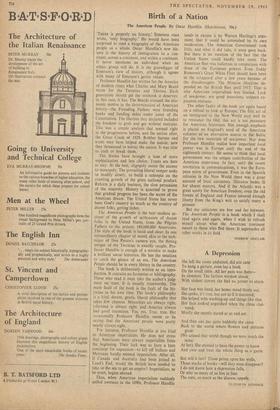Birth of a Nation
The American People. By Oscar Handlin. (Hutchinson, 30s.)
'THERE is properly no history,' Emerson once wrote, 'only biography.' He would have been surprised to read a biography of the American people as a whole. Oscar Handlin's new his- tory is the history of immigration to a con- tinent, across a continent, and within a continent. It never mentions an individual when an ethnic group will do. It is the gravedigger of Emerson's view of history, although it agrees with many of Emerson's gentle values.
Professor Handlin has written for.the America of modern times what Charles and Mary Beard wrote for the Twenties and Thirties. Each generation should get the textbook it deserves; in this case, it has. The Beards stressed the eco- nomic motive in the determination of American history—the Founding Fathers were founding banks and funding debts under cover of the Constitution. The liberties they declared included the freedom to grab and get without restraint. This was a simple analysis that seemed right to the progressives before, and the nation after, the Great Crash of 1929. Robber barons and trusts may have helped make the nation; now they threatened to betray the nation: It was time to curb or break them.
The Sixties have brought a time of more sophistication and less choice. Trusts are here to stay. At the best, oligopoly seems the answer to monopoly. The prevailing liberal temper seeks to modify slowly, to build a subtopia on the crawling growth of the gross national product. Reform is a daily business, the slow persuasion of the majority. History is quarried to prove that gradual progress has been the secret of the American dream. The United States has never been God's country so much as the country of decent folks, getting richer.
The American People is the best modern ac- count of the growth of settlements of decent folks in the United States, from the Pilgrim Fathers to the present 180,000,000 Americans. The style of the book is lucid and clear. In one extraordinary chapter of mood, akin to the tech- nique of Dos Passos's camera eye, the flitting temper of the Twenties is exactly caught. Pro- fessor Handlin is enough of a novelist to make a brilliant social historian. He has the intuition to catch the glance of an era. The American People should be in every library in the country.
The book is deliberately written as an intro- duction. It contains no footnotes or bibliography. Those who read it must take the author's judg- ment on trust. It is usually trustworthy. The main fault of the book is the fault of the his- torian in his own time. The book's philosophy is a kind, decent, gentle, liberal philosophy that takes few chances. Minorities are always right, tolerance is always right, and America always had good intentions. Yes, yes. True, true. But occasionally Professor Handlin seems to be saying that the American people were pretty nearly always right.
For instance, Professor Handlin is too kind to American imperialism. He does not stress that Americans were always imperialists from the beginning. Their luck was to have a bare continent for expansion—to kill off Indians and Mexicans hardly seemed imperialism. After all, if Canada and Australia had been joined to Land's End, would the British have needed to take to the sea to get an empire'? Imperialism, to be overt, begins abroad.
Thus, when American imperialism suddenly spilled overseas in the 1890s, Professor Handlin
tends to excuse it by Warren Hastings's argu- ment, that it could be astonished by its own moderation. The American Government took little, and what it did take, it soon gave back. But there is no mention of the fact that the United States could hardly take more. The American fleet was ludicrous in comparison with those of the European powers. Even Teddy Roosevelt's Great White Fleet should have been in the scrapyard after a few years because of the dreadnoughts. The Monroe Doctrine de- pended on the British fleet until 1917. That is why American imperialism was limited. Lack of sea-power, not good intentions, stopped ex- pansion overseas.
The other faults of the book are again based on a refusal to look at Europe. The first act of an immigrant to the New World may well be to renounce the Old; this act is not necessary for American historians. Not enough emphasis is placed on England's need of the American colonies as an alternative source to the Baltic for the raw materials of sea-power. Nor does Professor Handlin realise how important local power was in Europe until the end of the eighteenth century. He seems to think that local government was the unique contribution of the American experience. In fact, until the recent revolution in communications, it was the Euro- pean norm of government. Even in the Spanish colonies in the New World there was a great amount of local autonomy. Distance bodes ill for absent masters. And if the Atlantic was a great surety for American freedom, even the old forests of England and France ensured enough liberty from the King's writ to satisfy many a pioneer.
But my criticisms are few and far between. The American People is a book which I shall read again and again, when I wish to refresh myself about what the American continent meant to those who fled there. It supersedes all other works in its field.
ANDREW SINCLAIR






























































 Previous page
Previous page